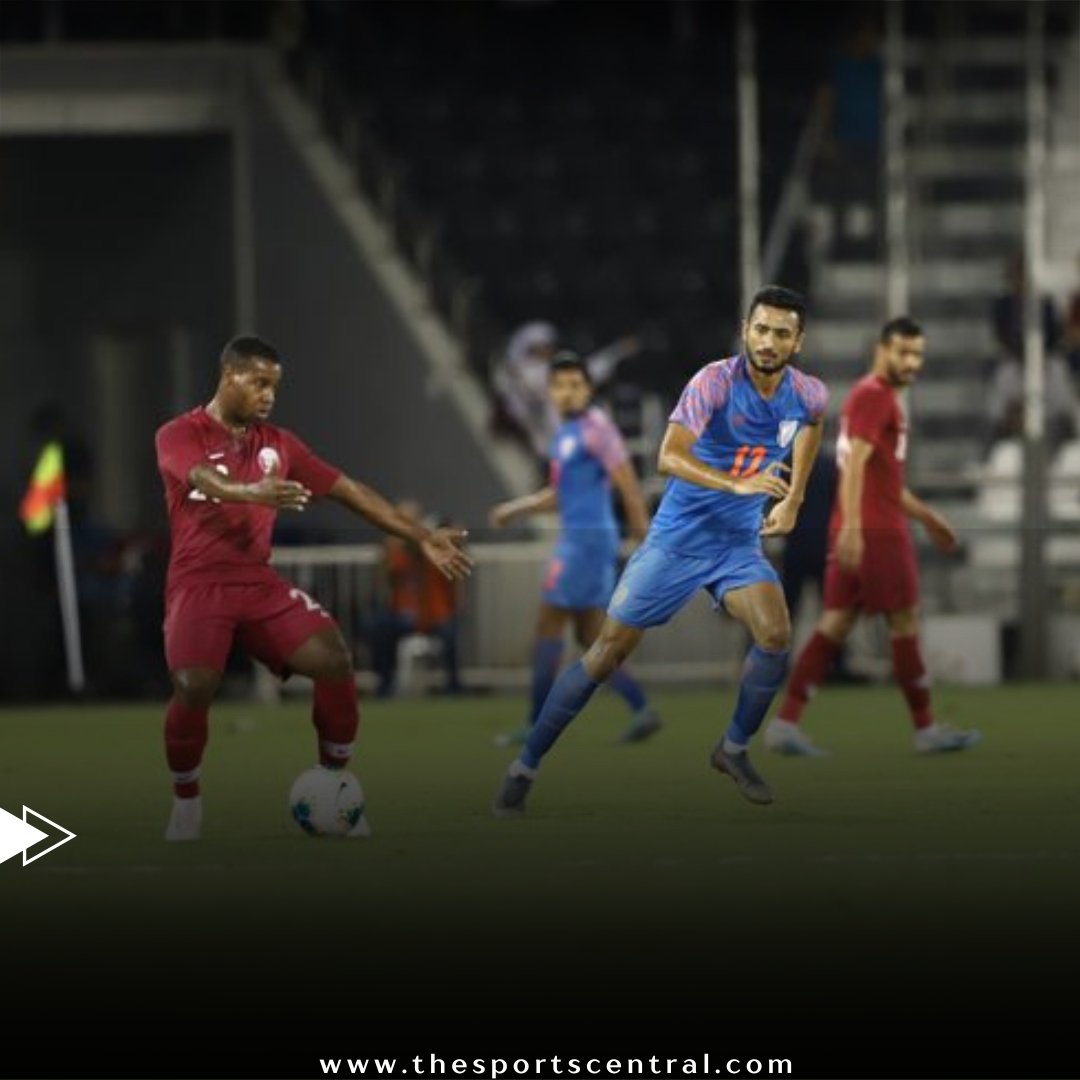The All India Football Federation (AIFF) has called for a thorough investigation into the contentious goal awarded to Qatar in their crucial World Cup qualifying match held in Doha. AIFF President Kalyan Chaubey announced on Wednesday that India has formally requested the concerned authorities to address what they perceive as a grave injustice. The match, which took place at Jassim Bin Hamad Stadium on Tuesday, ended in a 1-2 defeat for India, a result that eliminated them from progressing to the third round of the FIFA World Cup Qualifiers for the 2026 edition.
The Controversial Goal
The controversy centers around a goal scored by Qatar in the 73rd minute of the match. Abdullah Alahrak’s free-kick led to a header attempt by Yousef Ayem, which was initially saved by Indian goalkeeper and captain Gurpreet Singh Sandhu. However, as Sandhu lay on the ground, the ball appeared to roll out of play. Despite this, Qatar’s Hashmi Hussein kicked the ball back into the field, allowing Aymen to slot it into the net.
South Korean referee Kim Woo-Sung awarded the goal, ignoring the fact that the ball had clearly gone out of play. This decision sparked widespread outrage among the Indian players and fans, as it effectively ended India’s hopes of advancing to the next round of qualifiers.
AIFF’s Response
In the aftermath of the match, AIFF President Kalyan Chaubey issued a statement expressing deep dissatisfaction with the referee’s decision. “Victory and defeat are part and parcel of the game, and we have learned to accept them gracefully,” Chaubey said. “However, one of the two goals scored against India last night left a few questions unanswered.”
The AIFF has taken the matter up with FIFA and the Asian Football Confederation (AFC). “We have written to the FIFA Head of Qualifiers, AFC Head of Referees, and the match commissioner, regarding the grave supervision error that practically cost us a place in the FIFA World Cup Qualifiers Round 3,” Chaubey added. “Given its severity, we call upon concerned officials for a thorough investigation. We have urged them to explore the possibilities of sporting compensation to address the injustice, and we trust that FIFA and AFC will take the necessary steps.”
The Role of the Match Commissioner
The match commissioner for the game was Iran’s Hamed Momeni. His responsibilities included supervising the organisation of the match and ensuring adherence to FIFA regulations. The AIFF’s complaint suggests that Momeni failed to uphold these responsibilities, particularly in overseeing the correct application of the rules regarding the controversial goal.
The Referee’s Decision
Referee Kim Woo-Sung’s decision to award the goal despite the ball going out of play has been widely criticised. According to the rules of the game, the match should have been stopped, and a corner kick awarded to Qatar since Sandhu was the last player to touch the ball before it crossed the line. Instead, the referee allowed play to continue, leading to Qatar’s second goal.
The Indian players protested vehemently, but Woo-Sung upheld his decision. The lack of intervention from the Video Assistant Referee (VAR) system, which was expected to correct such errors, has also raised questions about the officiating standards and technological support in the match.
Implications of the Decision
The controversial goal not only led to India’s defeat but also deprived the team of their maiden entry into the third round of the FIFA World Cup Qualifiers. This decision has significant implications for Indian football, as progressing to the next round would have provided the team with greater exposure, experience, and opportunities to compete at a higher level.
For the players, coaching staff, and fans, the controversial goal is a bitter pill to swallow. The sense of injustice is palpable, as many believe that the team was unfairly denied a legitimate chance to achieve a historic milestone.
Reactions from the Football Community
The incident has elicited strong reactions from the football community, both within India and internationally. Prominent figures in Indian football, former players, and fans have taken to social media to express their outrage and disappointment.
Sunil Chhetri, India’s star forward, tweeted, “Gutted by the result and the manner in which we lost. We played our hearts out, but the decision to award that goal was just wrong. We deserve better.”
Former Indian captain Baichung Bhutia echoed similar sentiments. “The team worked so hard to get to this stage, and to see it end like this is heartbreaking. The authorities must investigate and ensure such mistakes do not happen again.”
Internationally, the incident has also caught the attention of football analysts and commentators. Many have questioned the effectiveness of the VAR system in critical matches and called for greater accountability in officiating.
The Path Forward
As the AIFF pushes for an investigation, the focus now shifts to FIFA and the AFC. The governing bodies must address the complaint thoroughly and transparently to maintain the integrity of the sport.
Potential Outcomes
Review and Rectification: FIFA and AFC could review the match footage and referee’s report, potentially acknowledging the error. However, overturning the result is highly unlikely given the precedent in football’s governing rules.
Sporting Compensation: While unprecedented, the AIFF’s request for sporting compensation could lead to discussions on how to fairly address such situations in the future. This could include replays or other compensatory measures.
Improved Officiating and Technology: The incident underscores the need for improved officiating standards and more effective use of technology like VAR. FIFA and AFC might implement stricter protocols and training for referees to prevent similar errors.
Support for Affected Teams: Beyond addressing the specific incident, the governing bodies might explore ways to support affected teams, ensuring that their development and competitive opportunities are not unduly hindered by officiating errors.
Focus on Development
For the AIFF and the Indian football community, the incident, while disheartening, also serves as a rallying point for continued development and improvement. The federation can use this experience to advocate for better infrastructure, training, and resources for Indian football.
Grassroots Initiatives
Enhancing grassroots initiatives to identify and nurture young talent will be crucial. Building a robust pipeline of players who can compete at the international level will help mitigate the impact of such setbacks in the future.
Strengthening the National Team
Continued investment in the national team’s development, including better training facilities, international exposure, and high-quality coaching staff, will be essential. The AIFF can also work towards scheduling more competitive fixtures against higher-ranked teams to prepare the players for crucial matches.
Fan Engagement and Support
Maintaining the enthusiasm and support of the fans is vital. The AIFF should engage with the fan base, acknowledging their disappointment while highlighting the team’s progress and potential. Creating a strong sense of community and support around the national team will be key to its future success.
The controversial goal awarded to Qatar in the World Cup qualifying match has cast a shadow over India’s footballing aspirations. However, the AIFF’s proactive approach in seeking an investigation reflects a commitment to justice and fair play. As FIFA and AFC review the incident, the hope is that necessary actions will be taken to address the grievances and prevent such occurrences in the future.
For Indian football, this incident, while a setback, can also be a catalyst for growth and improvement. By focusing on development, investing in talent, and engaging with fans, Indian football can emerge stronger and more resilient. The journey to the World Cup may be fraught with challenges, but with determination and unity, India can aspire to reach new heights in the beautiful game
write your reviews for us at Google Reviews.










